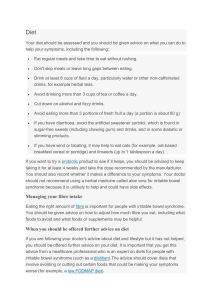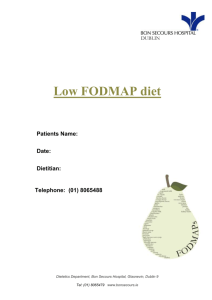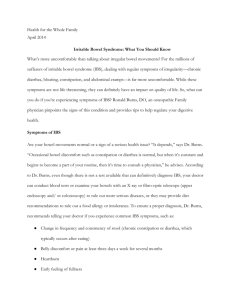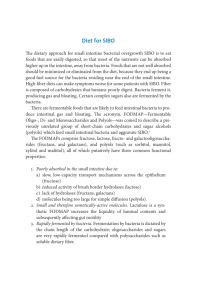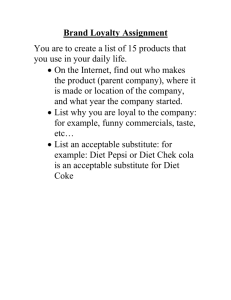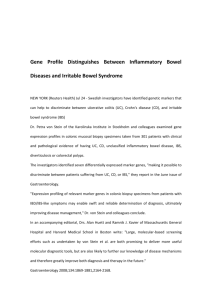Low FODMAP Diet Latest Treatment of IBS
advertisement
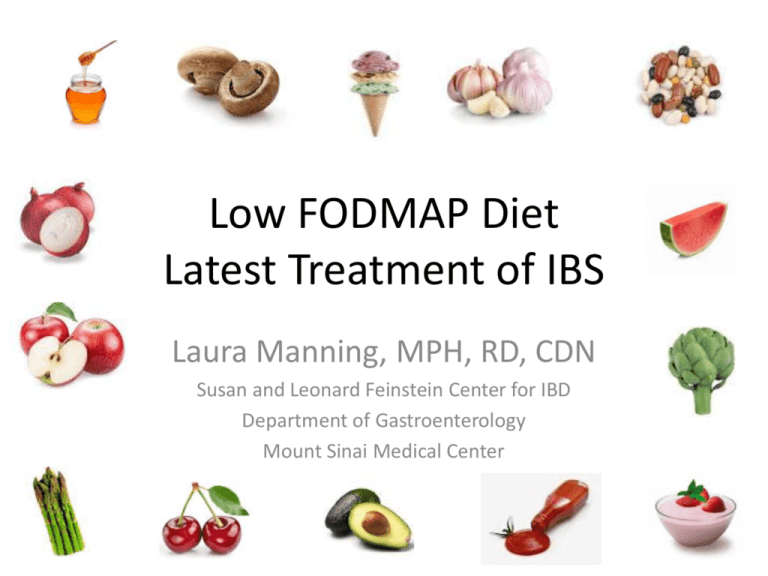
Low FODMAP Diet Latest Treatment of IBS Laura Manning, MPH, RD, CDN Susan and Leonard Feinstein Center for IBD Department of Gastroenterology Mount Sinai Medical Center Agenda 1. What is IBS and possible causes 2. Review-How do we digest short chain carbs 3. What is the Low FODMAP diet 4. How to implement it in your practice 1 Irritable Bowel Syndrome (IBS) • A condition characterized by abdominal pain, bloating, flatus and altered bowel habits . - Induced by intestinal luminal distention in addition to visceral hypersensitivity. - Dietary factors may alter luminal distention with increased water and gas volume, causing diarrhea. - Other symptoms: tiredness, heartburn, nausea, fogginess. 1 1. Camillieri, M. Am J Physiol Gastrointest Liver Physiol, 2012. 2 Facts about Irritable Bowel Syndrome (IBS) • Affects 25 to 45 million people in US, more common in females. • Usually under the age of 50 • Possible cause: disturbance in the gut-brainnervous system interact. • Impacts physical, emotional, financial and social well being. Typically brought on by stress. • Few seek medical care- 20-40% of GI visits are due to IBS.* 3 *International Foundation for Functional Gut Disorders (IFFGD) https://www.aboutibs.org/site/what-is-ibs/facts/ 4 Allergy vs. Intolerance • Food Allergy- the reproducible adverse reaction arising from specific immune responses occurring from specific food antigens. IgE mediated • Food Intolerance- Similar reactions that occur without evidence of immunologic mechanisms. (causing IBS) 2 2. Boettcher E, Crowe SE. Am J Gastroenterology, 2013. 5 Possible causes • Malabsorption of carbohydrates causing onset of symptoms. • Non Celiac Gluten Sensitivity (NCGS)- new clinical condition. 3 4 3. Sheparhd SJ, et al. Clin Gastroenterol Hepatol, 2008 4. Biesiekierski JR, et al. Am J Gastroenterol, 2011 6 Current Food Trends • Fructose-Our intake of fructose is increased to 22% of daily caloric intake-High fructose corn syrup (HFCS) in soda, candy and food products. • Fructans- due to a wheat-heavy culture. • Inulin- added in “Functional Foods”, formulas! • Polyols- sugar free additives to lower calories and to protect teeth (gums and mints). 7 Fructose and Fructans • Largest amount in North American and Western European diets 8 Changes in gut bacteria • Patients with IBS may have lower Lactobacillus and Bifidiobacterium species in their intestinal flora. • High meat and dairy diets are shown to change gut flora 5 5. Kassinen A, et al. Gastroenterology. 2007 9 10 Alteration of Gut Bacteria • • • • • • • • • High antibiotic use, especially in children C-sections High animal protein and dairy diet Intestinal surgeries: ICR, bariatric Celiac disease Motility disorders: gastroparesis Inflammatory Bowel Disease (IBD) Post infectious IBS: gastroenteritis Small Intestinal Bacterial Overgrowth (SIBO) 11 Maybe they can’t digest certain carbohydrates? • FIBER- long chain, non-digestible carbs in small intestine. Important for stool formation an proper bowel function • STARCH- long chain carbs completely digested in the small intestine. • SUGARS- short chain carbs that may or may not be easily digested. Depends on the type……. 12 How are they not digested • Malabsorbed and pull water (osmotic shift) in to the small intestine and cause diarrhea. • When sugars reach the large intestine, they ferment by bacteria and cause gas. The gas can slow movement through the bowel causing constipation. • Additionally: nausea, bloating, and cramps. 13 14 http://www.ncbi.nlm.nih.gov/core/lw/2.0/html/tileshop_pmc/tileshop_pmc_inline.html?title=Click%20on%20image%20to%20zoom&p=PMC3&id=3966 170_GH-11-739-g002.jpg Fermentable Oligo-Di- Monosaccharides and Polyols (FODMAPs) • A heterogeneous group of poorly absorbed, short-chain carbohydrates, which seem to be possible IBS symptom inducers. Restricting these from the diet could produce beneficial effects. • Term coined in 2005 by a group of Australian researchers at Monash University claiming that these forms of carbs may worsen symptoms of IBS and IBD. 6 6. Gibson PR, Shepard SJ. Aliment Pharmacol Ther. 2005. 15 Shepard, SJ. Et al. J Am Diet Assoc. 2006 • Using a retrospective study-74% of patients reported symptom improvement utilizing the Low FODMAP diet regimen. 16 Halmos EP, Gastroenterology. 2014 • Crossover study where patients with IBS effectively reduced functional GI symptoms when on a Low FODMAP diet. * FODMAPs are not the cause of functional bowel disorders, but will act as a trigger. 17 FODMAPs • • • • Lactose- dairy Fructose- fruits Fructans/GOS- wheat, beans Polyols- sugar alcohols 18 19 Digestion of Fructose • Free fructose, a simple sugar, requires no digestion. -Absorbed in the small intestine in 2 ways: 1. Co transport with GLUT-2 (a glucose/ fructose transporter). • If equal amounts of glucose are available , fructose is efficiently taken up after sucrose hydrolysis. 2. And by alternative transporter GLUT 5 in excess fructose amounts which is present in the border of enterocytes in small intestine. * If fructose load is very large, malabsorption likely will occur 20 Fructose Malabsorption • 40% of the population are considered to have fructose malabsorption. 7 • We can typically digest fruits if they have a 1:1 ratio of glucose to fructose. On the diet, 1 serving per day. 7. Douard V. J Physiol. 2013. 21 Fructose • Fruits: Apples, cherries, mangoes, pears, watermelon • Vegetables: asparagus, artichokes, sugar snap peas • Honey, HFCS More intensified in dried fruits and overall volume amounts 22 Lactose • A di-saccharide (Glucose and Galactose) - Requires lactase enzyme to break it down in small intestine - Typically occurs in quantities greater than 7g 1. Varying enzymes amounts in the gut are influenced by: Genetics Ethnic background Gut disorders 23 Lactose • • • • • Milk: cow, goat and sheep Yogurt Ice cream Custard Soft Cheeses: Ricotta, cottage 24 Oligosaccharides Fructans and Galactans (GOS) Fructans and Galactans are the storage carbohydrate of many vegetables • Fructose polymer with a glucose terminal end - We do not have the enzymes to break these down and therefore are rapidly fermented, causing gas and bloating - Typically a great pre-biotic! 25 Fructans • Peach, persimmon, watermelon • Artichokes, asparagus, Brussels sprouts, chicory, fennel, garlic, onions, leeks • Wheat, rye, barley • Pistachios, cashews • Beans • Inulin 26 GOS • Beans- raffinose - Lacking the enzyme a-galactosidase Baked beans, kidney beans, chick peas, Brussels sprouts and cabbage 27 Polyols • The sugar alcohols/ sugar substitutes: • Only 1/3 is absorbed in small intestine - By passive diffusion dependent on molecular size and pore size in the small intestine. Sorbitol, Mannitol, Xylitol, Erythriol, Isomalt Foods: Apples, apricots, cherries, blackberries, plums, mushrooms, cauliflower Laxatives 28 A Bucket Effect- all FODMAPs are consumed at once causing a cumulative effect! 29 Typical meal Breakfast: Frosted Mini Wheats and milk, tea with honey Lunch: wheat bread with turkey and American cheese and an apple, cranberry juice Snack: regular, peach flavored yogurt and pretzels Dinner: pasta with tomato sauce and meatballs with a side of asparagus Snack: handful of cashews 30 Loaded with FODMAPs Breakfast: Frosted Mini Wheats and milk, tea with honey Lunch: wheat bread with turkey and American cheese and an apple, cranberry juice Snack: regular, peach flavored yogurt Pretzels Dinner: pasta with tomato sauce and meatballs with a side of asparagus Snack: Handful of cashews 31 High FODMAP Foods & Crossover Lactose Fructose Fructans/ GOS Polyols Milk Artichoke Artichoke Cauliflower Yogurt Asparagus Garlic Mushrooms Ice cream Tomatoes Onions Peas Ricotta Apples Beans Apples Cottage Cherries Apples Pears Custard Figs Figs Plums Pears Plums Watermelon Watermelon Wheat Sorbitol Agave Inulin Xylitol Honey Pistachios HFCS Watermelon 32 Variations to consider • Clinical testing at Monash Univ. Formal list constructed from mechanical testing of foods • Different levels in foods depending on ripeness • Different volume of carb load per person • Different levels of tolerance per person • Some foods have not been tested yet 33 Further Modifications • Change the texture of the diet based on the patient symptoms. Ex: IBS-D - Cook all vegetables, no salads - Have nut butters over nuts - Lower fat overall - No fruits on an empty stomach 34 Low FODMAP Diet-Best approaches • Work with a dietitian familiar with the diet • Step 1: Elimination Phase. A global restriction will have better outcomes versus choosing 1-2 categories to limit. • A temporary diet: 2-6 weeks max • Step 2: Reintroduction Phase. Intro of one category at a time to test intolerance and volume limits 7 35 Low FODMAPs • Lactose: Aged cheese, LF dairy, Brie, Mozzarella, kefir, LF yogurtplain, rice milk, coconut milk • Fructose: (1 serving per meal) bananas, blueberries, strawberries, grapes, honeydew, cantaloupe, maple syrup, table sugar • Fructans/GOS: bok choy, bell peppers, Swiss chard, carrots, spinach, zucchini, GF breads, GF pasta, potatoes, quinoa, oats, polenta, 10-15 nuts: almonds, macadamia, peanuts, pine nuts, pumpkin seeds, flax and chia seeds. Firm tofu, tempeh • Polyols: banana, blueberry, cantaloupe, coconut, lemon, limes, papaya, rhubarb, table sugar, maple syrup, aspartame, stevia 36 Moderate FODMAPs • Fructans: (limited to 1 choice per meal) beet root4 slices, broccoli-1/2 cup, butternut squash-1/4 cup, peas -1/3 cup, pomegranate-1/2 small, sweet corn-1/2 cob, canned pumpkin -1/4 cup, canned chickpeas-1/4 cup, canned lentils-1/2 cup • Polyols: (limited to 1 choice per meal) avocado-1/8, celery-1/4 stalk, sweet potato-1/2 cup • Beverages: espresso, tea: black/white/green/mint, • Alcohol: (limited to 1 drink per day) most wine and beer, vodka, gin and whisky 37 Proficient Label Reading! • A label may contain a high FODMAP ingredient, but look where it falls on the list 38 There’s an APP for that 39 What about Fats and Proteins? • • - All fats are fine- no carb in them The following proteins are acceptable: Poultry, beef, lamb, pork, eggs and fish Nuts, limited to a handful. Nut butters, 2 TBS Firm tofu, tempeh, seitan 40 Elimination phase- Sample diet Breakfast: 1 cup corn flakes 1 cup lactose free milk ½ ripe banana 1 cup coffee with lactose free milk and 1 tsp sugar Snack Handful of almonds Lunch 2 slices spelt sourdough bread 2 ounces of turkey 1 tablespoon real mayo Lettuce and tomato ½ cup fresh blueberries ½ cup baby carrots Snack ½ cup lactose free cottage cheese 8 cherry tomatoes Dinner 3 ounces baked salmon 1 cup cooked zucchini Medium baked potato 1.5 tbsp sour cream 2 cups raw spinach ½ cup sliced bell pepper 1 tsp evoo 1 tbsp balsamic vinegar Drinks: water, allowable tea 41 Adding Flavor • Garlic infused oils- cook garlic in oil and remove • Herbs: (keep ‘em fresh) basil, cilantro, coriander, rosemary, parsley, tarragon, thyme • Stock- made without garlic and onions 42 Eating out • Review menus ahead of time on line and have a plan of action • Give instruction about how you would like food to be cooked- baked, broiled, lemon and herbs. • Bring snacks, avoid being un-prepared when starving 43 Possible Negative Implications • Avoid eliminating whole food groups • May be low fiber content - Work in chia seeds, psyllium husk, ground flax and allowable whole grains • Limited intake of Prebiotics may not be beneficial for extended periods of time, decreasing concentrations of bifidiobacteria. 8 Staudacher, et al. J Nutr, 2012. 44 Reintroduction Phase 1. As soon as the person starts to feel like their symptoms have significantly lessened, start introducing foods back into to the diet- one category at a time 2. Do not use foods that cross over categories 3. Introduce a small amount, once a day for three days 4. Check in to see if there is any reoccurrence if no, return to Low FODMAP diet and start the next category! 5. Keep a log of symptoms as you go 45 Sample Re-Intro Fructans wheat, garlic and onions should be tested separately Monday, Tuesday, Wednesday- add 1 teaspoon of chopped garlic to one meal ONCE a day. If ok, resume Low FODMAP diet and go to next category Fructose Thursday, Friday, Saturday- add 1-2 tsp of honey once a day. 46 Re-Intro • • • Lactose- drink ½ cup of milk Polyols- test Sorbitol and Mannitol separately Sorbitol, have 1 peach Mannitol, have ½ cup mushrooms once a day GOS- have ½ cup of kidney beans * If person failed a challenge, resume low FODMAP diet and wait three days without symptoms. 47 Diet Of Info! • Person walks away with information on how to manage their condition and can choose to alter their diet as needed. * Gives a sense of empowerment! 48 Important movers and shakers in the Low FODMAP method: • Patsy Catsos, MS, RDN, LD • Kate Scarlatta, RD • Monash University, Aurtralia:http://www.med.monash.edu/cecs/ gastro/fodmap/ • Mark Pimentel, MD The New IBS Solution 49 Quote From A Friend What did we ever do before FODMAPs? - Tamara Duker Freuman 50 Published reviews (small sample) • • • • • • • • • • • • • • • • • • • • 5 Evidence-based dietary management of functional gastrointestinal symptoms: The FODMAP approach - Journal of Gastroenterology and Hepatology 25 (2010) 252-258 Fructose Malabsorption and Symptoms of Irritable Bowel Syndrome: Guidelines for Effective Dietary Management – Journal of the American Dietetic Association;2006;106:pp1631-1639. Dietary Triggers of Abdominal Symptoms in Patients With Irritable Bowel Syndrome: Randomized Placebo-Controlled Evidence – Randomized Placebo-Controlled Evidence – Clinical Gastroenterology and Hepatology, 2008:6 (7) pp765-771. Coeliac Disease and A Gluten Free Diet – Healthy and Heartwise Magazine. Reduction of dietary poorly absorbed short-chain carbohydrates (FODMAPs) improves abdominal symptoms in patients with inflammatory bowel disease – a pilot study – Journal of Crohn’s and Colitis 2008:3(1), pp8-14. Understanding the Gluten-free Diet For Teaching in Australia – Nutrition and Dietetics. 2006:63: pp155-165. Food for thought: Western Lifestyle and Susceptibility to Crohn’s Disease – The FODMAP Hypothesis – Alimentary Pharmacology & Therapeutics; 2005:21: 1399-1409. Review article: Fructose Malabsorption and The Bigger Picture – Alimentary Pharmacology. & Therapeutics. 2007;25(4) pp349-363. For Celiac Disease, Diagnosis Is Not Enough- Clin. Gastroenterol. Hepatol. 2012;8:900-901. Nutritional inadequacies of the gluten‐free diet in both recently‐diagnosed and long‐term patients with coeliac disease- J. Human. Nutr. 2012 DOI: 10.1111/jhn.12018. Food Choice as a Key Management Strategy for Functional Gastrointestinal Symptoms- Am. J. Gastroenterol. 2012; 107:657–666. Manipulation of dietary short chain carbohydrates alters the pattern of hydrogen and methane gas production and genesis of symptoms in patients with irritable bowel syndrome- J Gastroenterol. Hepatol. 2010 Aug ;25(8):1366-73. Dietary FODMAPs increase delivery of water and fermentable substrates to the proximal colon - Aliment. Pharmacol. Therapeutics. 2010;31(8):874-882. Comparison of the prevalence of fructose and lactose malabsorption across chronic intestinal disorders - Aliment. Pharmacol. Therapeutics 2009;30(2):165-74. A Diet Low in FODMAPs Reduces Symptoms of Irritable Bowel Syndrome.- Gastroenterology 2014;146(1)67-75. Characterization of Adults With a Self-Diagnosis of Non-celiac Gluten Sensitivity. Nutrition in Clinical Practice- Nutr. Clin. Pract. 2014. Short-Chain Carbohydrates and Functional Gastrointestinal Disorders- Am. J. Gastroenterol. 2013;108:707-717. Design of Clinical Trials Evaluating Dietary Interventions in Patients With Functional Gastrointestinal Disorders- Am. J. Gastroenterol. 2013;108: 748-758. Reduction of dietary poorly absorbed short-chain carbohydrates (FODMAPs) improves abdominal symptoms in patients with inflammatory bowel disease—a pilot study - J. Crohn’s Colitis 2009;3(1):8-14. Pilot study on the effect of reducing dietary FODMAP intake on bowel function in patients without a colon. - Inflamm. Bowel Dis. 2007;13(12):1522-8 . 51 THANK YOU! Laura Manning Laura.manning@mountsinai.org 52
